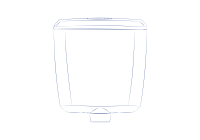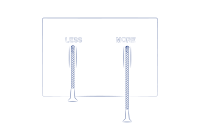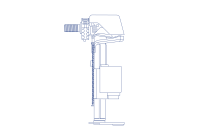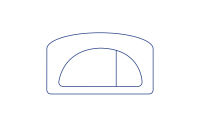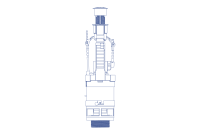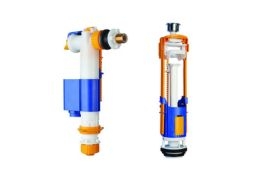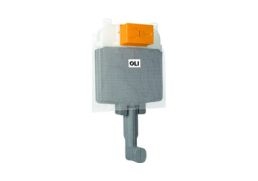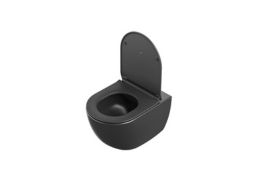Water Sustainability
Water, this gift that hydrates us and irrigates the fields that provide us with nourishment. This sea on which we navigate, this rain that holds the world in balance. What future awaits it? What future awaits us? "Water, as future." is more than a statement, it's a belief in responding to the threat that involves water. This is what drives us at OLI every day. Contributing to saving water, the efficiency of its use, the sustainability of its origin and the respect for this element at every moment of its use. It is knowing that there is a learning process to be done and that this is the time for it. We are concerned just as we are motivated by the knowledge that throughout our history we have contributed towards more responsible and sustainable water consumption. Flushing with lower consumption, more efficient use of water without wasting water in the bathroom are all part of OLI's principles. And this also leverages our future.
OLI believes in water efficiency in the bathroom and is committed to the quest for a more sustainable world. It is estimated that in the near future we could reach a potable water deficit of 40 per cent, making the adoption of new consumption methods a matter of urgency, especially in the bathroom which is responsible for around 30 per cent of our water consumption at home. Some of our contributions go towards solutions that are more hydraulically and economically sustainable.
On this page, we demonstrate our contribution to water sustainability and more efficient solutions.
The core of OLI's products is centred on the use of water as a cleaning and hygiene tool. It is essential to recognise the importance of this valuable resource and the risks associated with its scarcity. In this sense, it is essential to create and develop products that enable more efficient use of water in flushing cisterns and throughout the sanitary system.
OLI's contribution worldwide has included the mass introduction of dual-flush cisterns, the first-rate invention of Plus Technology, which saves 0.5L of water per flush, and the constant optimisation of elements that allow for increasingly efficient water flushes, such as 4L and 2L flushes instead of 6L and 3L.
These initiatives not only benefit the environment, but also contribute directly to the preservation of water resources across the planet.
PLUS SYSTEM
This is a system created by OLI in which the inlet valve delays the inflow of water into the cistern to prevent extra water being used for flushing. While flushing takes place, no new water enters the cistern. This allows saving up to 9 litres of water per day, corresponding to a 12% reduction in water bill.
SAVE UP TO 9L
OF WATER PER DAY
DUAL FLUSH
Combining an efficient valve and a flush plate with half-flush and full-flush options. In 1994, OLI was responsible for the mass introduction of dual flush cisterns, bringing huge environmental and economic benefits on a global scale.
With this invention, a flush valve was created that allowed the user to choose between two flush volumes (half or full flush), depending on the cleaning and hygiene needs of the toilet.
This OLI system, which is now universal, contributes to a 50 per cent reduction in the volume of water flushed down toilets, as it allows the user to flush only 3 litres (what we call a half flush).
4/2 LITRES
The combination of a 4-litre (full flush) and 2-litre (half flush) in-wall cistern with an efficient and suitable toilet for this purpose results in immediate water savings.
SAVING 2L*
Complete flush
SAVING 1L*
Half flush
*Compared to a 6/3 litre cistern
CISTERN WITH 2 INLET VALVES
This flushing cistern is distinguished by having two water inlet valves in its architecture. One for drinking water from the mains and another for non-potable water designed for rainwater, but applicable to other waters (boreholes or water wells) ensuring that only clear and filtered water is used. In this way it’s possible to reuse rainwater for toilet flushing, saving drinking water that is essential for human consumption. It allows a more efficient use of the water resource and a saving in the water bill.
SAVE 100%
OF DRINKING WATER ON TOILET FLUSHING
Exclusive connection to a second source of Water
SAVE 50%
OF DRINKING WATER ON TOILET FLUSHING
Connection to water mains + Connection to a second water source
OLI80 SEAWATER
Aware of the scarcity of water in some countries around the world, we have developed an in-wall cistern prepared to use salt water for flushing - OLI80 SEAWATER.
WATER SCARCITY
Water scarcity is a growing problem around the world, affecting more than 2 billion people. Unavailability of drinking water and inadequate management of water resources have had a severe impact on the environment and on people's health. In order to guarantee the sustainability of water resources, it is essential to adopt responsible behaviour in our daily lives. It's up to each one of us to take responsibility for looking after water and to take steps to ensure the availability of this resource for future generations.
Data source: ONU
PROMOTE SUSTAINABILITY AND BE A CHANGE AGENT
- Install water-saving products: products with OLI's PLUS system save 0.5L of water;
- Reuse rainwater: a cistern with 2 inlet valves can direct non-potable water for use;
- Use the flush consciously: dual flush plates, including half flush, prevent unnecessary use;
- Promote water-saving awareness: suitable tanks and sanitary ware can provide 4/2 litre flushes, helping to reduce consumption;
- Use efficient mixers: OLI's OCEAN range incorporates a water-saving perlator that maximises water savings (ANQIP A - A+ certified).
• Image generated by Artificial Intelligence
